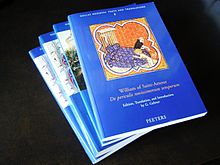- Dallas Medieval Texts and Translations
-
Dallas Medieval Texts and Translations is a book series sponsored by the University of Dallas and published by Peeters, a publishing house based in Louvain, Belgium. Modeled upon the Loeb Classical Library, the Dallas series has the goal "to build a library of medieval Latin texts, with English translations, from the period roughly between 500 and 1500, that will represent the whole breadth and variety of medieval civilization."[1] The editorial board of the series is composed of several medievalists from the University of Dallas and Southern Methodist University; Philipp W. Rosemann, a professor of philosophy at UD, has the overall responsibility. Members of an international board of editorial advisers review manuscripts submitted to the series to ensure their quality.[2]
The first volume of the series appeared in 2002; as of August, 2011, twelve volumes have been published, while twenty more are in preparation.[3] In November, 2010, Harvard University Press launched a similar project, the Dumbarton Oaks Medieval Library. It is different from the Dallas series in that it also publishes texts in Byzantine Greek and Old English.
List of Published Volumes
vol. 1: Manegold of Lautenbach, Liber contra Wolfelmum. Translated with an Introduction and Notes by Robert Ziomkowski. xvi-152 pp., ISBN 978-90-429-1192-5.
vol. 2: Ranulph Higden, Ars componendi sermones. Translated by Margaret Jennings and Sally A. Wilson. Introduction and Notes by Margaret Jennings. x-76 pp., ISBN 978-90-429-1242-7.
vol. 3: Mystical Theology: The Glosses by Thomas Gallus and the Commentary of Robert Grosseteste on "De Mystica Theologia." Edition, Translation, and Introduction by James McEvoy. xii-139 pp., ISBN 978-90-429-1310-3.
vol. 4: A Thirteenth-Century Textbook of Mystical Theology at the University of Paris: The "Mystical Theology" of Dionysius the Areopagite in Eriugena's Latin Translation with the Scholia translated by Anastasius the Librarian and Excerpts from Eriugena's "Periphyseon." Edition, Translation, and Introduction by L. Michael Harrington. xii-127 pp., ISBN 978-90-429-1394-3.
vol. 5: Henry of Ghent's "Summa": The Questions on God's Existence and Essence (Articles 21-24). Translation by Jos Decorte (†) and Roland J. Teske, S.J. Latin Text, Introduction, and Notes by Roland J. Teske, S.J. x-290 pp., ISBN 978-90-429-1590-9.
vol. 6: Henry of Ghent's "Summa": The Questions on God's Unity and Simplicity (Articles 25-30). Latin Text, Introduction, Translation, and Notes by Roland J. Teske, S.J. xi-388 pp., ISBN 978-90-429-1811-5.
vol. 7: Viking Attacks on Paris: The "Bella parisiacae urbis" of Abbo of Saint-Germain-des-Prés. Edition, Translation, and Introduction by Nirmal Dass. x-130 pp., ISBN 978-90-429-1916-7.
vol. 8: William of Saint-Amour, De periculis novissimorum temporum. Edition, Translation, and Introduction by G. Geltner. xiv-157 pp., ISBN 978-90-429-2010-1.
vol. 9: Albert of Saxony, Quaestiones circa logicam (Twenty-Five Disputed Questions on Logic). Introduction, Translation, and Notes by Michael J. Fitzgerald. x-261 pp., ISBN 978-90-429-2074-3.
vol. 10: Thomas Bradwardine, Insolubilia. Edition, Translation, and Introduction by Stephen Read. ix-236 pp., ISBN 978-90-429-2317-1.
vol. 11: Hildegard of Bingen, Two Hagiographies: Vita sancti Rupperti confessoris, Vita sancti Dysibodi episcopi. Introduction and Translation by Hugh Feiss, O.S.B. Edition by Christopher P. Evans. x-163 pp., ISBN 978-90-429-2318-8.
vol. 12: On the Ecclesiastical Hierarchy: The Thirteenth-Century Textbook Edition. Edition, Translation, and Introduction by L. Michael Harrington. xiv-296 pp., ISBN 978-90-429-2481-9.
Notes
- ^ "The Project," at http://www.udallas.edu/academics/centers/dmtt/project.
- ^ See "Board of Editorial Advisers," at http://www.udallas.edu/academics/centers/dmtt/board.
- ^ For the complete list, see http://www.udallas.edu/academics/centers/dmtt/pubvolumes and http://www.udallas.edu/academics/centers/dmtt/futvolumes.
Categories:- Dual-language series of texts
Wikimedia Foundation. 2010.

